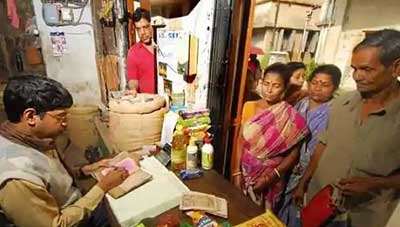Date: 14/01/2023
Relevance: GS-2: Issues related to direct and indirect farm subsidies and minimum support prices; Public Distribution System- objectives, functioning, limitations, revamping; issues of buffer stocks and food security.
Key Phrases: PMGKY, NFSA, Public Distribution System, Beneficiaries, Fiscal Deficit, Inflation, Fiscally Neutral, Income Transfer Programme, Minimum Support Prices.
Context:
- Union Government finally ended the free food grain scheme under the Pradhan Mantri Garib Kalyan Yojana (PMGKY) from 1 January. The scheme was introduced as part of the pandemic relief effort in March 2020.
- The scheme provided 5 kg of free cereals, rice or wheat to eligible Public Distribution System (PDS) beneficiaries.
Key Highlights:
- The primary reason for the discontinuation of the scheme is the inflating fiscal deficit of the government.
- While saving food-subsidy cost on the erstwhile PMGKY, the government also decided to forgo the token prices collected from NFSA beneficiaries for food grain entitlement through the Public Distribution System (PDS).
- This additional step will cost the government a small sum of ₹18,000 crore. However, the impact of both these measures taken together is likely to be an additional monthly spending of around ₹500-600 for a household of four members, as they will now have to purchase an additional 5 kg from the market if they need it.
Was It The Best Option?
- The PMGKY was meant to provide a cushion to the majority of rural and urban poor against the loss of income and employment during the pandemic. While pandemic-related disruptions are over, most indicators of the rural economy suggest that distress persists.
- Given that cereal inflation has been in double digits with no signs of slowing, the additional food grain could have been continued until inflationary pressures cooled.
- The decision to reduce PDS prices to ‘free’ is unlikely to save the government much and will also be a difficult decision to reverse. So it may not the best option in the short or long run.
Do You Know?
- Fiscal deficit is defined as excess of total budget expenditure over
total budget receipts excluding borrowings during a fiscal year. In
simple words, it is amount of borrowing the government has to resort to
meet its expenses. A large deficit means a large amount of borrowing.
- Fiscal deficit is a measure of how much the government needs to borrow from the market to meet its expenditure when its resources are inadequate.
- Fiscal deficit = Total expenditure – Total receipts excluding borrowings = Borrowing
Reforms in Public Distribution System (PDS):
- PDS system, used by the NFSA and PMGKY both, has played an important role in recent years with 75% coverage of rural areas and 50% of urban.
- Several studies have documented that enlarging the beneficiary pool has helped in curbing leakages and increasing efficiency of the PDS.
- However, despite several economists and the Supreme Court too reminding the government to increase its number of beneficiaries to adjust for population increase, there has been no effort to do so.
- Perhaps a better option would have been to expand the beneficiary roll while retaining subsidized issue prices for food staples. That would have been a fiscally neutral step.
- In the case of NFSA and also PMGKY, it is erroneous to treat them as an income transfer programme. The basic purpose as envisaged is to make essential food grains available to a large majority of the population at affordable and stable prices.
- More than an income transfer, it is the availability and stability of prices that play an important role in assuring Indians food security.
Way Forward:
- When the NFSA was enacted, an issue price of ₹3/2/1 was fixed for three years. After that, it was supposed to change as prices increased, so long as it remained under the minimum support prices (MSPs) of the crops.
- By simply increasing prices a little to keep real prices constant, the government could have raised the quantum of grains given to beneficiaries without affecting its fiscal discipline.
- Raising the prices to even half the MSP levels would have allowed entitlement to increase to 7-8 kg per person.
- It is also possible to provide pulses and edible oil, which were given during the pandemic. These are not just essential sources of nutrition as far as proteins and fats go, but are also part of the NFSA objectives.
- With India having declared 2023 as “the year of millets”, it is time to diversify away from the rice/wheat combination and provide people nutritious food.
Conclusion:
- The PDS plays an important role for consumers, but equally so for farmers, as it enables government procurement for distribution. Diversifying to oilseeds and pulses, for which the country is highly import-dependent, is essential to incentivize their production.
- Government has missed an opportunity to take bold steps towards reforming the PDS in line with NFSA goals. Doing so is not just essential for ensuring food security in its true sense, but is also fiscally prudent.
Source: The Indian Express
Mains Question:
Q. With India having declared 2023 as “the year of millets”, it is time to diversify away from the rice/wheat combination and provide people nutritious food. PDS can play a crucial role in it. Discuss (150 words).






















